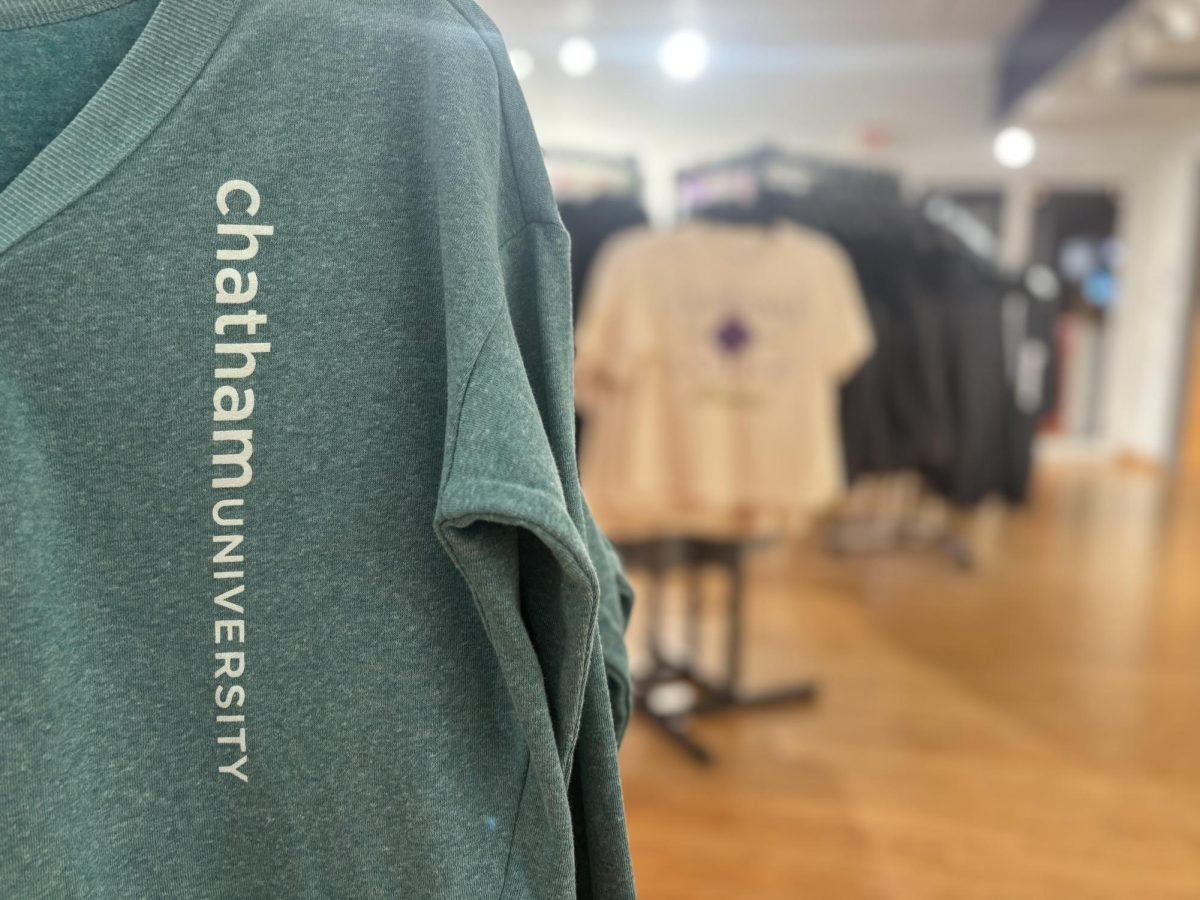Woodland Hall saw changes this summer as the campus bookstore, now the gear store, moved into the space next to Cafe Rachel where the Susan Bergman Gurrentz ‘56 Art Gallery used to live. The art gallery has moved into the classroom next door, Woodland 103.
Both spaces are fully operational, so that there has been little to no disruption to the student experience.
Two-part model
For Chatham, the University’s contract with the bookstore’s previous provider, Follett, was up for renewal in 2024. At the time, the foot traffic and sales for the bookstore were extremely low.
“When I got involved and started to dig into the bookstore and began to find out that it was underperforming,” Vice President of Operations and Communications Bill Campbell said. “I was like, well, let’s promote more. Let’s do more things. Let’s get more visibility to the bookstore, because I think its retail location was really not great, right? A basement of Woodland [Hall]. That’s not where you see most campus bookstores, and the bookstore was underperforming accordingly.”
After the COVID-19 pandemic, some business models for university bookstores began to recommend disaggregating: separating the textbook providers from university merchandise sales. Chatham made the decision to pursue this model and find two separate vendors for gear and textbooks.
Out of three potential vendors, Chatham ultimately chose Parkhurst, the University’s dining service provider, to take over the merchandise aspect of the bookstore.
“It was very cost prohibitive to enter into a contract because our sales were so low, so [the vendors] wanted to protect themselves until their sales could get higher. So the components of the Parkhurst deal actually worked out better for the University, because the other ones would have cost a lot more money,” Campbell said.
The University ultimately settled on eCampus, an online textbook company, to manage the textbook side with plans to run shipments and buybacks out of the post office on campus.
“Based on a cost analysis, we found that the price points of eCampus are significantly lower than what was in the current bookstore textbook model,” Campbell said. “I think [eCampus] is going to bring a lot more choice and affordability to our students in terms of textbooks, and better integration and tools to help faculty load [textbooks] in [to the eCampus system].”
ECampus allows any student, residential or off-campus, to ship their school supplies directly to the mailroom with no additional shipping fee.
To date, eCampus has shown a 9% increase in sales compared to Follett, according to Mailroom and Copy Center Manager Ed White who has taken on a major role in this transition, managing both the moving of the gear store as well as the transition to eCampus.
Change in location
As Chatham talked to Follett and two other vendors to find the best fit to move forward for the gear store aspect of the former bookstore, all three vendors required the University to change the retail location of the gear store.
“One of the prerequisites for everybody we talked to was that the location of the bookstore was not something they would want to enter into. It didn’t have a good retail location. It didn’t have enough prominence for current students and prospective students,” Campbell said. “So that led to conversations about where and how and when could we perhaps relocate the bookstore if that was the case.”
Chatham ultimately settled on the art gallery space, considering its central location on campus and its proximity to Cafe Rachel, according to Campbell. The move looks to create synergy between Cafe Rachel and the gear store, with flow between the coffee shop and merchandise sale.
“I have not [purchased things from the bookstore], mainly because I forget that it’s there,” Andrei Arboleda ‘27 said about the former location. The new location is “definitely better than the previous one, just because it’s connected to [Cafe] Rachel and I feel like I definitely see more people going into the gear store.”
With the move next to Cafe Rachel, the University looks to drive more foot traffic to the gear store and increase sales.
Change in price point
Arboleda also expressed that he did not purchase from the bookstore often because he couldn’t justify paying the bookstore’s prices.
“I personally didn’t really go to the gear store prior [to the] change and also post, but I know they have more stuff, but I’ve heard some of it is expensive,” Arboleda ‘27 said.
The price points of the merchandise under Follett contributed in some part to the decline in sales that led Chatham to consider other vendors in 2024.
“One of the things that I had heard over time was the price points weren’t necessarily student friendly, so that’s something that’s been very sensitive,” White said. “Without getting too specific, I know there was previously a sweatshirt for $60. We’re about $34 now, so much more economical from the student end.”
There are no firm numbers on whether the gear store has seen an increase in sales, according to White, because they do not have access to Follett’s records.



